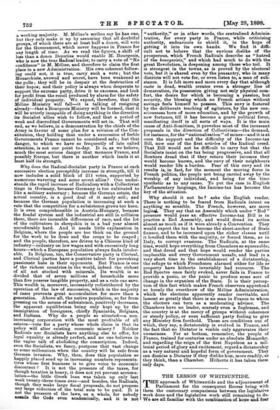M. MELINE'S DEFEAT.
THE total result of the French elections, which was undetermined when we wrote a fortnight ago owing to the vexatious and illogical system of second ballots, proves to be most disastrous for the existing Government, and possibly even for the Republic. The Republicans, who are at once sincere and moderate, have failed to secure a working majority. M. lifeline's scribes say he has one, but they only make it up by assuming that all doubtful groups, of which there are at least half a dozen, will vote for the Government, which never happens in France for any length of time. As we read the figures, a shift of less than a dozen Deputies would enable M. Bourgeois, who is now the true Radical leader, to carry a vote of "No confidence" in M. Moline, and therefore to claim the first place in a new Administration. His own coherent follow- ing could not, it is true, carry such a vote ; but the Monarchists, avowed and secret, have been weakened at the polls ; they will be in despair at the destruction of their hopes; and their policy is always when desperate to support the extreme party, drive it to excesses, and look for profit from the recoil produced by alarm for the safety of individual property. We expect, therefore, that the Melina Ministry will fall—it is talking of resigning already—that a Bourgeois Ministry will be formed, that it will be utterly incapable of doing anything in the direction its Socialist allies wish to follow, and that a period of weak and discredited Governments will set in. That will end, as we believe, in a demonstration by the chiefs of the Army in favour of some plan for a revision of the Con- stitution, they holding that under a succession of feeble Governments France cannot be considered safe; but that danger, to which we have so frequently of late called attention, is not our point to-day. It is, as we believe, much the most serious danger that menaces France, and possibly Europe, but there is another which lends it at Least half its strength.
Why does the Radical-Socialist party in France at each successive election perceptibly increase in strength, till it now includes a solid block of 211 votes, supported by numerous wavering and some secret allies ? One under- stands the rapid increase of Radicalism with a Collectivist tinge in Germany, because Germany is too cultivated to like a military autocracy ; because the German estate, the actual country, is a good deal of it sandy soil; and because the German population is increasing at such a rate that the competition for a subsistence grows too keen. It is even comprehensible in Austria-Hungary, because the feudal system and the industrial are still in collision there, there are incurable differences of race, and the lot of the cultivators in sheepskin is in a bad year almost unendurably hard. And it needs little explanation in Belgium, where the people are too thick on the ground for the work to be done and the crops to be reaped ; and the people, therefore, are driven to a Chinese kind of industry—industry on low wages and with excessively long hours—which a European population always finds intoler- able. In Belgium, too, the Conservative party is Clerical, and Clerical parties have a positive talent for provoking passionate hate in their opponents. But France is one of the richest countries in the world, indeed the richest of all not stocked with minerals. Its wealth is so divided that of seven millions of households more than five possess tangible property, and as a rule can save. This wealth is, moreover, incessantly redistributed by the operation of the law of succession, which in the majority of cases prevents great accumulation for more than a. generation. Above all, the native population, so far from pressing on the means of subsistence, positively decreases, the apparent equilibrium being only kept up by the immigration of foreigners, chiefly Spaniards, Belgians, and Italians. Why do a people so situated—a non- increasing corporation with the most profitable of all estates—vote for a party whose whole claim is that its policy will alter existing economic misery ? Neither Radicals nor Socialists have anything else to offer, for legal equality is already perfect, and no one believes in the vague talk of abolishing the conscription. Indeed, even the Socialists, we fancy, postpone that vast change to some millennium when the country will be safe from German invasion. Why, then, does this population so happily placed send up in increasing numbers representa- tives whose first business is to give voice to economic discontent ? It is not the pressure of the taxes, for though taxation is heavy, it does not yet prevent accumu- lation—the little Greek loan was taken up only last week twenty-three times over—and besides, the Radicals, though they make large fiscal proposals, do not propose any large reduction of the total sum to be paid. It is not the pressure of the laws, as a whole, for nobody assails the Code even academically, and it is not "authority," or in other words, the centralised Adminis- tration, for every party in France, while criticising authority, endeavours to shield it, in the hope of getting it into its own bands. We find it diffi- cult not to believe that the envious dislike of the prosperous, which French Radicals describe as "hatred of the bourgeoisie," and which had much to do with the great Revolution, is deepening among those who toil. It is strongest in the towns, as is proved by the electoral vote, but it is shared even by the peasantry, who in many districts will not vote for, or even listen to, a man of sub- stance. It is felt more and more every day that although caste is dead, wealth creates even a stronger line of demarcation, its possession giving not only physical com- fort, the desire for which is becoming a passion, but security, the blessing which no French artisan without savings feels himself to possess. This envy is fostered by the deliberate teaching of agitators, by the new con- sciousness born of more education, and by the growth of new fortunes, till it has become a grave political force, manifesting itself in all sorts of ways. It is the main cause of Anti-Semitism, it provokes most of the incessant proposals in the direction of Collectivism—the demand, for instance, for the "nationalisation" of mines—and it is at once the support and the difficulty of the Income-tax Bill, now one of the first articles of the Radical creed. That Bill would not be difficult to carry but that the Socialists insist on the tax being progressive, and that all Rentiers dread that if they return their incomes they would become known, and the envy of their neighbours would render life a burden. Fear of this envy and its results is, in fact, for the moment the moving force in French politics, the people not being carried away by the worship of any individual, and being for the time apathetic as to any cause. To put the case in English Parliamentary language, the Income-tax has become the key of the situation.
Why should it not be ? asks the English reader. There is nothing to be feared from Radicals intent on anything so sensible. The French, however, are more logic. They say that an Assembly which under " Red " pressure would pass an effective Income-tax Bill is in practice a Red Assembly, and would dread its action almost as much as if it were already a Convention. They would expect the tax to become the sheet-anchor of State finance, and to be increased upon the richer classes until it levelled them with the majority, or forced them, as in Italy, to corrupt evasions. The Radicals, at the same time, would hope everything from Chambers so squeezable; and that dread and that hope would render the parties implacable and every Government unsafe, and lead in a very short time to the establishment of a dictatorship, the refuge to which Frenchmen alarmed either for life or property have hitherto invariably had recourse. The Red Spectre once fairly evoked, never fails in France to provide a panic, or the panic to produce some sort of change in the organism of the State. It is their percep- tion of this fact which makes French observers apprehend so keenly the overthrow of the Maine Administration, which the elections apparently render inevitable, and lament so greatly that there is no man in France to whom the electors can turn as a moderating adviser. The Chambers have no leader, scarcely even a fugleman, and the country is at the mercy of groups without coherence or steady policy, or even sufficient party feeling to give any Ministry firm foothold. Those are conditions out of which, they say, a dictatorship is evolved in France, and the fact that no Dictator is visible only aggravates their uneasiness. For at bottom, remember, the people of France, trained for centuries under an absolute Monarchy, and regarding the reign of the first Napoleon as a mil- lenial period of glory and excitement, regard a dictatorship as a very natural and hopeful form of government. They can dismiss a Dictator if they dislike him, more readily, as they think, than a Chamber. Hitherto it has taken them only days.



































 Previous page
Previous page